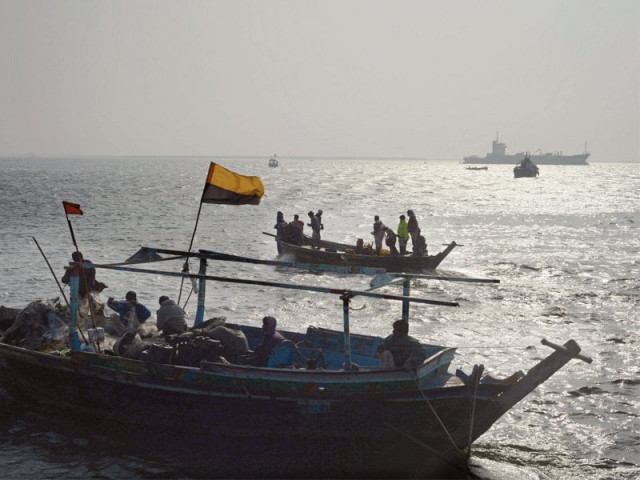Sir Creek dispute: Forgotten victims of ‘Kashmir of the seas’
Fishermen are regularly locked up for illegally entering the neighbouring country.

Authorities on both the sides of the border often capture fishermen who unknowingly cross it. PHOTO: AFP
In a fly-blown wooden hut in the Pakistani coastal village of Rerhy, at the edge of the vast metropolis of Karachi, Hamida mourns her husband Nawaz, once a fisherman, like those preparing their multicoloured boats on the nearby shore.
Nawaz went to sea in 1999, two days before a violent storm struck. His family thought he was dead but seven years later they received a letter saying he was alive – in an Indian prison.
Then last autumn Hamida suffered a shuddering blow: without any warning, her husband’s body was delivered to the village.

The dispute over Sir Creek, a 100-kilometre strip of water in marshland dividing the Indian province of Gujarat from the Pakistani province of Sindh, is less well-known.
The creek opens out into the Arabian Sea and is noted for its rich stocks of fish, but fishermen who brave the area are regularly locked up for illegally entering the neighbouring country.
Ganesh Kumar was detained by Pakistan in October in an Indian boat. “There were seven of us in the boat and I didn’t know where I was. The man who owned the boat should have known,” the 19-year-old told AFP in Karachi’s Malir jail.
There are more than 200 Indian fishermen in custody in Malir, according to jailer Nazir Hussain Shah.

In India, 125 Pakistani fishermen are imprisoned, according to Manish Lodhari, secretary of India’s National Fishworkers’ Forum.
Syed Sarim Burney, a lawyer who defends some of the Indians in Pakistan, said the fishermen are at the mercy of the authorities.
“They are thrown in jail for years without committing any crime,” he said.
“There is no visible sea demarcation between the two countries so the navy of each country can arrest the people of the neighbouring country whenever they want.”
The men fish using simple boats with little in the way of modern navigational technology such as GPS to help them pinpoint their location, Burney explained.
Delhi and Islamabad have been seeking to improve ties in recent years and fishermen were freed several times last year as “goodwill gestures”, though in October Pakistan seized 33 Indians less than a month after freeing 48.
Depleting fish stocks as a result of environmental changes brought about by industrial pollution and the building of dams across the Indus may also be playing a role in the territorial dispute.
As a result, Pakistani fishermen have spread further east, closer to India and disputed waters where they say stocks are more plentiful.
Published in The Express Tribune, January 21st, 2013.



















COMMENTS
Comments are moderated and generally will be posted if they are on-topic and not abusive.
For more information, please see our Comments FAQ